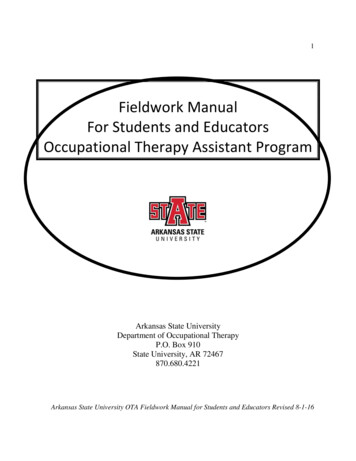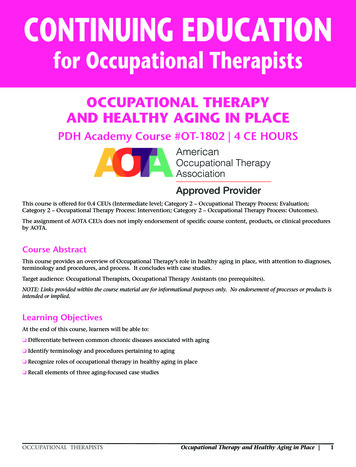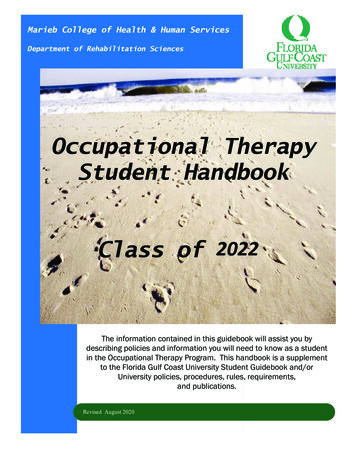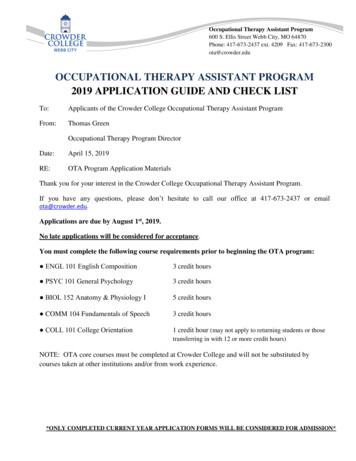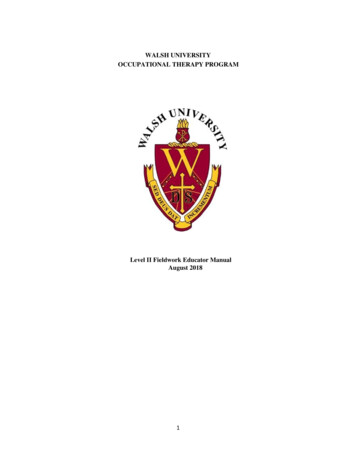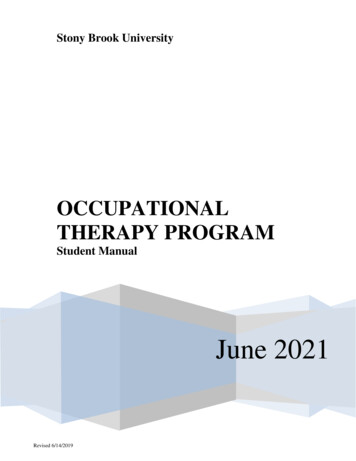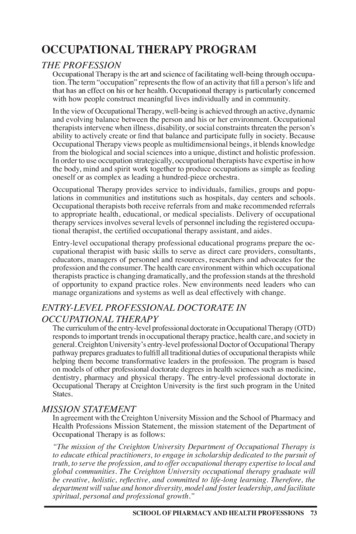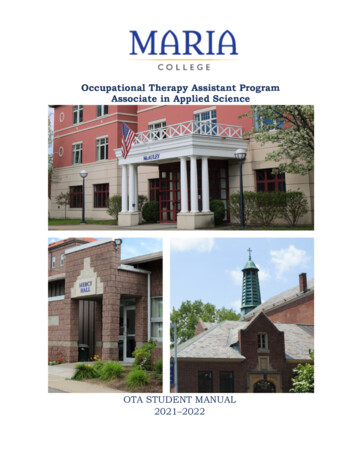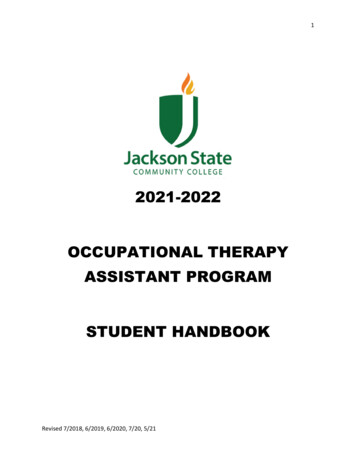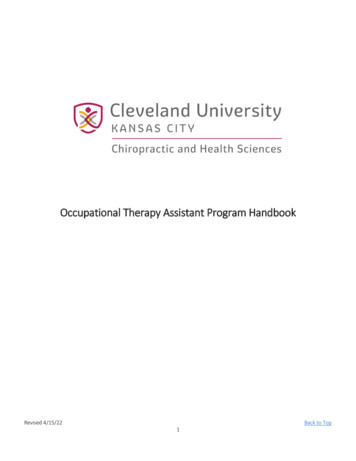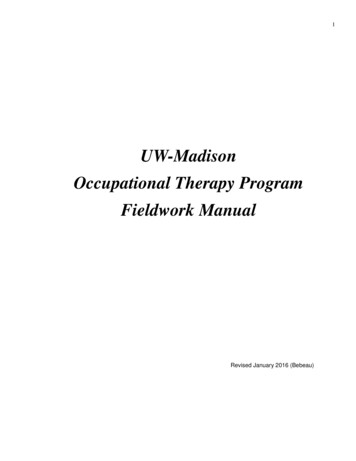
Transcription
1UW-MadisonOccupational Therapy ProgramFieldwork ManualRevised January 2016 (Bebeau)
2Table of ContentsNBCOT AND WISCONSIN LICENSURE INFORMATION (also Forms p. 37) . 5OVERVIEW OF LEVEL I FIELDWORK. 8OVERVIEW OF LEVEL II FIELDWORK . 9Time Requirement . 9Part-time Status . 9Prerequisite to Level II Fieldwork . 9Timing of Level II Fieldwork . 9Early Commitment Sites . 9Selection Process . 10Placement Materials Provided to Fieldwork Sites . 10Financial Aid . 10Liability Insurance . 10Health Insurance . 11Time between Placements . 11New Fieldwork Contracts . 11Summer versus Fall Placement Options . 11AOTA Performance Evaluation Form . 11Student Evaluation of Fieldwork Experience Form . 12Supervision . 12Level II Fieldwork Dates . 13Graduation . 13DESCRIPTION OF LEVEL II FIELDWORK AT UW-MADISON . 14TRANSITIONING TO LEVEL II FIELDWORK . 15
3LEVEL II FIELDWORK POLICIES. 16Fieldwork Placements . 16Attendance . 16Fieldwork Facility Assignments and Requirements . 16Grading . 16Failure of Level II Fieldwork Students/Students Dropped from the Academic Program. 17Dropped Fieldwork . 17Canceled Fieldwork . 18Publishing of Materials . 18Confidentiality . 19Social Networking Policy . 19Conflict of Interest . 19Liability . 20Accidents and Injuries to Students . 20Optional 3rd Level II Fieldwork . 20LEVEL II FIELDWORK OBJECTIVES. 21TYPES OF FIELDWORK SITES . 23PREPARATION FOR LEVEL II FIELDWORK . 25Enrollment Instructions for Level II Fieldwork . 25Residency for Tuition Purposes . 25Graduation and Fieldwork Requirements . 25Health Requirements . 25Housing . 26Review . 26Email Introduction . 26DURING LEVEL II FIELDWORK . 28Professional Behaviors . 28Dress and Appearance . 28Midterm Evaluation. 28Contact with the UW-Madison Academic Program . 28Problems on Fieldwork . 29Strategies for Success on Fieldwork . 29
4SUCCESSFULLY COMPLETING LEVEL II FIELDWORK . 30Checklist for Completion of Fieldwork and NBCOT Application. 30Temporary State Licensure . 31Continuing Education . 30Payment for the Services of Therapy Students under Part B of Medicare . 32Frequently Asked Student Questions about Fieldwork . 34FORMS: FIELDWORK, NBCOT, WISCONSIN LICENSURE (also page 5) . 37
5NBCOT AND LICENSURE INFORMATION All Wisconsin Department of Regulation and Licensing forms are completed by the UWMadison School of Education Academic Dean’s Office, 1000 Bascom Mall, Madison WI53706. This includes any form that requires signature of the Dean or a school seal. Emailyour form and request to Mitchell L. Patton, mlpatton@wisc.edu, 608-262-5630. After the UW Madison fieldwork office receives both AOTA forms from your fieldworksupervisor (Fieldwork Performance Evaluation for the Occupational Therapy Student andStudent Evaluation of the Fieldwork Experience) of your second Level II fieldwork placementthe academic fieldwork coordinator (Debbie Bebeau) will submit your fieldwork grade. TheGraduate School then reviews your transcript and notifies the Office of the Registrar that youare an MSOT graduate. Throughout the 4 weeks following the end of fieldwork continue toaccess MyUW to determine whether your MSOT degree has been posted. After the degree isofficially posted onto your record you may submit an online order to the Office of the Registrarrequesting that they send your final transcript to NBCOT. You MUST begin the NBCOT online application before the end of your second Level IIfieldwork placement. Read the entire NBCOT handbook at www.nbcot.org, including the“Submitting the Application” section. It is essential to complete the NBCOT online application before the end of your second LevelII fieldwork placement. Your official graduation date is in December. Your second Level IIfieldwork placement is October-December. NBCOT closes their online site for holiday breakfrom late December to mid-January. Only paper applications are accepted during holidaybreak. NBCOT will email you in late January with your authorization to test (ATT) and yourNBCOT online status will then reflect “ready or processed.” At that time you may register forthe exam.DO NOT tell an employer you are available to begin a new employment position in the weeksimmediately following fieldwork. Degree credentials will not be verified soon enough to obtaina temporary license.
6Additional Resources UW Madison Office of the Registrar, 333 East Campus Mall, Room 10101, Madison, WI53715-1384. Order your transcript at www.registrar.wisc.edu. NBCOT requires submission ofan official final transcript. This document must indicate that you have received your Masters ofScience in Occupational Therapy degree. Wisconsin Department of Regulation and Licensing documents including temporary licenseForm #1570 may be found at www.drl.wi.gov. Request Wisconsin public school certificationat Wisconsin Department of Public Instruction www.dpi.state.wi.us only after being licensedby State of Wisconsin Department of Regulation and Licensing. Debbie Bebeau, EdD, OTRAcademic Fieldwork CoordinatorUniversity of Wisconsin-Madison2165 Medical Sciences Center1300 University Ave.Madison, WI 53706608-262-0093 (phone)608 262-1639 (fax)dbebeau@education.wisc.edu Diplomas:Degree Audit & Diploma Services, (608) 262-3782333 East Campus Mall, Room 10101Madison, WI 53715-1384Diplomas are mailed to you approximately 12 weeks after fieldwork.Submit name changes at www.registrar.wisc.edu American Occupational Therapy AssociationMembership Division4720 Montgomery Lane Suite 200Bethesda MD 20824-1220301- 652-6611800-729-2682 member and fieldwork hotline301-652-7711 faxwww.aota.org Wisconsin Occupational Therapy Association122 E Olin Avenue Suite 165Madison WI 53713608-287-1606608-287-1608 faxwww.wota.net
7 Wisconsin Department of Regulation and LicensingBureau of Health Professions1400 E Washington AvenuePO Box 8935Madison WI 53708608-266-2112www.drl.wi.gov Licensure in States outside Wisconsin: Regulatory board contact information for statesoutside Wisconsin at www.aota.org. NBCOT (National Board for Certification of Occupational Therapists)12 S Summit Avenue Suite 100Gaithersburg MD 20877301-990-7979301-869-8492 faxwww.nbcot.org
8FieldworkUniversity of Wisconsin-MadisonOccupational Therapy ProgramOverview of Level I Fieldwork CPR and Immunization RequirementsAll Level I and Level II fieldwork students must complete cardiopulmonary resuscitation (CPR)certification on a biennial basis and students must maintain tuberculosis (TB) testing and influenza(flu) vaccine on an annual basis. Students must contact the fieldwork coordinator of their fieldworkplacement facility to determine whether the facility has specific health requirements. Some fieldworkfacilities require that additional TB testing occurs within 6 weeks of the fieldwork placement startdate. Examples include Mendota Mental Health Institute and Central Wisconsin Center. It is essentialto contact your fieldwork facility well in advance of your start date. Criminal Background Check and Health RequirementsStudents must complete establish an account at www.certifiedbackground.com. Students must submitinformation for a national criminal background check and submit CPR, TB, influenza and healthinsurance documentation. PurposeThe purpose of Level I fieldwork is to introduce the occupational therapy (OT) student to a variety ofsettings in which occupational therapists work. At UW-Madison all students will complete three 40hour Level I fieldwork experiences. These Level I experiences occur in conjunction with the UWMadison lifespan curriculum (i.e. Level I fieldwork in pediatrics while taking a pediatric course).Qualified supervisors for Level I fieldwork include but are not limited to OT practitioners,psychologists, social workers, physician assistants, teachers, recreational therapists, nurses andphysical therapists. Generic Abilities Assessment ToolLevel I fieldwork students are evaluated by the Generic Abilities Assessment tool (see Level I Formssection at the end of this manual). The student must receive a score of at least “3” in all areas to passLevel I fieldwork. If a student does not receive a score of “3”, the fieldwork coordinator, student andclinical supervisor will develop an “Action to Be Taken” plan. Action to Be TakenIf a student receives a score of “1” or “2” (needing improvement) on the Generic Abilities Assessmenttool, the student is responsible for scheduling a meeting with the UW-Madison fieldwork courseinstructor. The student and instructor collaborate on an improvement plan which will address theidentified areas. Specific requirements of the plan can be found in the "Fieldwork Forms" section atthe end of this manual.
9Overview of Level II Fieldwork Time RequirementThe completion of the equivalent of 24 weeks full-time Level II fieldwork is required to become aregistered occupational therapist. Level II fieldwork must be completed prior to receiving your degreeand taking the NBCOT Certification Exam. Both Level II fieldwork experiences must be completedwithin 24 months of the end of your UW-Madison academic course work. This is a requirement ofthe Accreditation Council for Occupational Therapy Education (ACOTE) and the National Board forCertification of Occupational Therapists (NBCOT). Part-time StatusIt is highly recommended that Level II fieldwork be completed on a full-time basis. In certaincircumstances Level II fieldwork may be completed on a part-time basis as defined by the UWMadison academic fieldwork program and the fieldwork placement facility. A part-time placementmust be in accordance with the usual and customary personnel policies of the fieldwork placementfacility and must be at least 50% of a full-time equivalent at that site. Prerequisite to Level II FieldworkAll UW-Madison academic occupational therapy program course work must be completed beforestudents are allowed to begin Level II fieldwork. A Master of Science degree in Occupational Therapyis issued ONLY after successful completion of required Level II fieldwork. The official graduationdate occurs in December following the completion of the second Level II fieldwork placement.Students participate in the May commencement ceremony after academic occupational therapyprogram course work is completed. If a student does not complete Level II fieldwork by December,then the official graduation date occurs in May or August of the next year. There are only threegraduation dates per year at UW-Madison: May, August and December. Students are eligible to sit forthe NBCOT certification exam after successfully completing all requirements for UW-Madisongraduation. Timing of Level II FieldworkLevel II experiences are completed in July, August, September (summer assignment) and October,November, December (fall assignment) after you complete a summer anatomy course and 4subsequent semesters of UW-Madison MSOT program course work. Research for Level II fieldworkoptions may begin during the first summer semester of your MS-OT program (during anatomy).Fieldwork information can be found online and in fieldwork binders. See the fieldwork placementassistant office, Room 2130 Medical Sciences Center (MSC). Early Commitment SitesThe UW-Madison fieldwork office contacts all contracted fieldwork facilities in October of your firstfall semester to solicit fieldwork placements for your class. Starting in late November some health carefacilities such as Rehabilitation Institute of Chicago, Mayo clinic in Minnesota and Froedtert Hospitalin Milwaukee begin to advertise early commitment fieldwork opportunities. The UW-Madisonacademic fieldwork coordinator may request a student essay of interest and resume. This informationwill be reviewed by the early commitment fieldwork facility. If you commit to a fieldwork placement,you are contracted with that facility and you may not cancel the fieldwork placement. Earlycommitment opportunities are offered simultaneously to other OT programs. Therefore, students
10should respond quickly to an early commitment advertisement if they are able commit to thatfieldwork placement. Selection ProcessThe majority of students will choose Level II fieldwork assignments during a selection process thatoccurs in March during the first spring semester of your MS-OT program. Students will submit a listof their top 4 fieldwork placement choices to the fieldwork office by a specified date in March. Thereare 2 Level II fieldwork choice submission dates or “rounds.” Round 1 is a list of 4 fieldwork choicesthat are your priority commitments and Round 2 is a list of 4 fieldwork choices to which you are alsoable to commit. You may choose either a summer or a fall fieldwork placement during Round 1. AfterRound 1 is complete you will receive an updated list indicating which fieldwork opportunities are stillavailable. Generally it is advisable to choose at least one adult physical disability placement to preparefor the certification (NBCOT) exam. The other placement needs to be in a different area of practicesuch as pediatrics or mental health. All fieldwork opportunities offered to us will be emailed to you inDecember. Those opportunities will be available in the March selection process. If a student hasalready chosen an early commitment opportunity, that is their Round 1 selection. If a student commitsto 2 early commitment opportunities, that student is finished with the Level II fieldwork selectionprocess and does not need to complete anything additional for Round 1or Round 2. Placement Materials Provided to Fieldwork SitesFieldwork placement materials outlining UW-Madison requirements are emailed to FieldworkCoordinators at each fieldwork placement site 4 months before your arrival. Your direct supervisormay not be aware that this information has been emailed to the coordinator OR if there has been achange in supervisors, this information may not reach your direct supervisor. If you arrive at the siteand find that copies of the evaluation forms are not in the hands of your supervisor, please contact theUW-Madison fieldwork assistant.One copy of each of the completed final evaluation forms is sent back to UW Madison fieldworkoffice by the fieldwork site or the student. Please do all you can to ensure that evaluation forms arereturned promptly at the end of your fieldwork placement. The fieldwork site usually retains a copy ofcompleted evaluations for their records. Be sure to keep a copy of each evaluation for your ownrecords. Financial AidIf you qualify for financial aid, it is available during fieldwork. The Financial Aid office can offer themost accurate information on financial aid during occupational therapy fieldwork. There is an optionof taking 6 credits in summer and 6 credits in fall if this provides you with more support financiallythrough a fellowship or other type of assistance. Please contact the academic fieldwork assistant ifyou prefer summer and fall registration versus fall only registration. Liability InsuranceThis refers to professional malpractice insurance. Each enrolled student is covered by UWmalpractice liability insurance. Information about UW liability coverage has been sent to eachfieldwork facility as part of the current contract. Occasionally a facility may request that a studentcarry their own professional liability insurance in addition to that provided by the university.
11 Health InsuranceHealth insurance coverage with the UW Madison Student Health Insurance Program (SHIP) isavailable to all enrolled students. Students must have health insurance to participate in the UWMSOT Program and fieldwork. SHIP provides immunization and TB test services only on the UWcampus so you must complete those health requirements before you leave Madison for fieldwork. Ifyou have a fieldwork placement somewhere other than Madison, SHIP does provide health coveragefor emergencies. You are not covered by workers compensation during fieldwork. NOTE: If you haveSHIP, obtain your health tests and immunizations before the end of the academic fall and springcalendar. You are not eligible for discounted health tests and immunizations SHIP over the summerunless you are enrolled as a full-time student. Time between PlacementsIn most cases, time off between fieldwork placements is limited. Take this under serious considerationwhen making your travel plans. Summer and fall fieldwork schedules usually provide approximately10 days between placements. New Fieldwork Contracts1) Initiation of a new fieldwork contract is not common. Contracts are negotiated by UWMadison attorneys and the legal administration of each health care facility or school system.The contract process is lengthy and not guaranteed. Students requesting new contracts maystill be required to participate in the fieldwork selection process with the rest of theirclassmates.2) If a student has a compelling reason to seek a new fieldwork contract, the student must meetwith the academic fieldwork coordinator to discuss the topic. If the coordinator agrees to thepursuit of a new contract, a written request must be emailed to the fieldwork coordinator witha thorough explanation including full contact information of the occupational therapy orrehabilitation services area of the fieldwork facility.3) New contracts are rare. Only 3 new contracts total are pursued per UW-Madison Masters inOccupational Therapy (MSOT) class of 26 students. If a new contract is pursued for a student,a 2nd new contract for that student cannot be considered until the entire process ofinvestigating the initial contract is complete. Summer versus Fall Placement OptionsIf you are interested in securing a pediatric placement, be advised that many of these occur in fallbecause public schools are in not in session during the summer, health care facility therapists oftentake vacations in summer and pediatric placements often require that the pediatric fieldwork be yoursecond level II experience. If you choose a fall adult physical disability slot for your Round 1 or earlycommitment selection and you also plan to complete a pediatric placement, your options will beconsiderably fewer. There are not many summer pediatric placement options. AOTA Performance Evaluation FormYour performance in the fieldwork experience will be observed and evaluated by your fieldworksupervisors. Since this is a part of the total educational process we encourage your clinical educators(fieldwork supervisors) to stress your strengths and to make suggestions for improvement in weakerareas in order to promote your professional growth.The University of Wisconsin-Madison uses AOTA’s Fieldwork Performance Evaluation for
12Occupational Therapists. This tool is now in the form of an online survey that will be sent to theclinical fieldwork coordinator for midterm and final scoring. For a sample ics/ms-in-occupational-therapy-msot. The form willbe reviewed during one of the fieldwork meetings. Review the form prior to starting fieldwork. Notethe types of behaviors and abilities that will be evaluated. Familiarize yourself with the rating systemso that you know what will be expected of you and how your performance will be evaluated. Eachfieldwork site has been asked to provide performance objectives specific for that site. If these areavailable, they are in the Fieldwork Office fieldwork site binders or within the online fieldwork sitesresource. To receive credit for the fieldwork courses OT662 and OT664 you must attain the AOTAminimum passing score of 90 at your midterm performance evaluation and 122 at your finalperformance evaluation. Student Evaluation of Fieldwork Experience FormStudents must complete an AOTA Student Evaluation of Fieldwork Experience for each placement.This is a written evaluation of the training program provided by the facility and may also be availablein online survey format. The Student Evaluation of Fieldwork Experience form has been developed bythe AOTA Commission on Education and is used by students from occupational therapy programsthroughout the country. The form will be made available to the facility and should be completedindependently by each student. A sample can be found in the Forms section at the end of thisdocument or see /ms-in-occupational-therapy-msot.Please confirm that UW-Madison academic courses are listed in the Student Evaluation of FieldworkExperience form that you utilize. The standard AOTA fieldwork experience form does not list UWMadison academic courses. SupervisionWe support a variety of supervisory models. Educational standards established by the AccreditationCouncil on Occupational Therapy Education (ACOTE) do not specify a supervisor-student ratio. It isnot necessary to have a 1:1 ratio. A collaborative model with several students being supervised by onesupervisor is a positive means of fostering teamwork skills. We encourage the collaborative model ofsupervision because it has been shown to facilitate student development of professional and collegialskills.Fieldwork supervision is an interactive process involving joint efforts by supervisor and student topromote, establish, maintain, and elevate a level of performance and service. If done well, supervisioncan foster growth, development, creativity and innovation. Supervision should provide guidance,support, encouragement and respect. Moving a student toward entry level competence is the goal. It isvery important for students to take an active role in this process. In order to ensure fieldwork successand minimize problems students should be prepared to be observed and evaluated, be able to acceptand process constructive feedback, and be willing to make behavior and attitude adjustments whenrequired. Good communication skills, self-knowledge and an open mind are crucial.
13 Level II Fieldwork Dates:2015Jun 29–Sept 18Sept 28–Dec 182016Jun 27-Sept 16Sept 26-Dec 162017Jun 26-Sept 15Sept 25-Dec 152018Jul 2-Sept 21Oct 1-Dec 212019Jul 1–Sept 20Sept 30–Dec 202020Jun 29-Sept 18Sept 28-Dec 182021Jun 28-Sept 17Sept 27-Dec 172022Jun 27-Sept 16Sept 26-Dec 16 GraduationThe official graduation date is in December at the end your second fieldwork placement. TraditionallyOT students participate in May commencement before starting Level II fieldwork. Commencementceremony and diploma information will be emailed to you.
14Description of Level II Fieldwork at UW-MadisonLevel II fieldwork sites are selected based on the quality of the Level II program offered, compatibilitywith UW-Madison OT Program curriculum design and student interest in type of experience andlocation. Students must complete Level II fieldwork in at least two different practice areas. Studentsare strongly encouraged to select placements that provide them with a wide range of experiencesworking with clients of various ages, having a variety of diagnoses. All placements are dependent onsite availability and contract viability. Fieldwork sites may be in the Madison area or throughout theUnited States.At the end of fieldwork students are expected to be able to practice OT at or above entry level in avariety of settings using a variety of models for practice. Throughout Level I and Level II fieldworkstudents are encouraged to seek out experiences in a variety of settings along the illness-wellnesscontinuum and, depending on interest, to include experiences related to administration, education andresearch when possible. Opportunities are available in wellness programs, acute hospital care, longterm care, schools, traditional institutional settings, community-based settings and private practices.The focus of fieldwork is on the integration of professional knowledge and behaviors and generalclinical skills. It is not recommended that students limit their FW to in-depth experiences in a narrowlydefined area of practice or any area of practice that is considered beyond that of entry level.Additionally, it is not recommended that students attempt to arrange FW in every type of unit or withevery diagnostic category of client seen at a particular location. The emphasis should be on mastery ofthe OT process from referral through discharge with a smaller number of clients and not solely onseeing a large number of clients.It is important to note that fieldwork is not a paid position and students
A Master of Science degree in Occupational Therapy is issued ONLY after successful completion of required Level II fieldwork. The official graduation date occurs in December following the completion of the second Level II fieldwork placement. Students participate in the May commencement ceremony after academic occupational therapy
